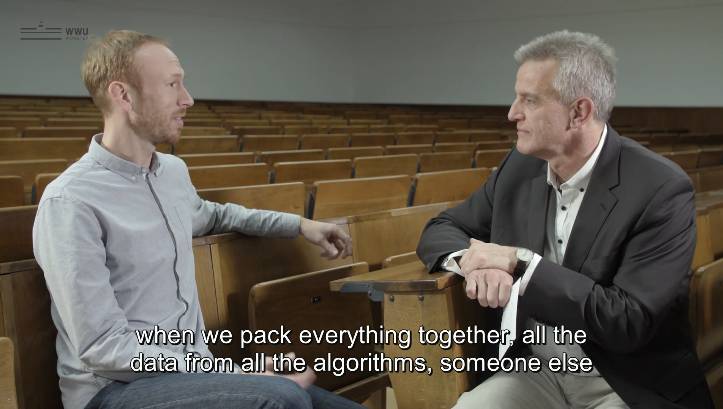Digitisation of Science @ WWU
27 Feb 2018 | By Daniel Nüsto2r Team member Daniel was invited by the university’s press office to participate in a series of interviews and articles on digitisation or “digitalisation” at the WWU Münster:
The video is now available online in German (embedded below) and with English subtitles. You can also watch it on Facebook or in the WWU video portal.
Daniel wrote a brief summary for our blog and shares his experience:
Interview summary
First we talked about how digitisation is a familiar topic for computer scientists professionally (digital data, algorithms), but also something we encounter as citizens. Next I explained the importance of reproducibility in science and when asked if that was not the case in the past, I outlined the new challenges of a completely digital research workflow. I summarise the idea of the o2r project and use the term “digital laboratory” as a metaphor for our Executable Research Compendium, which collects all research artefacts and opens them up in a transparent way and allows collaboration. We then briefly touch on the fact that the concepts and ideas are relevant for all sciences, but how o2r (and geoinformatics) focuses on geoscience applications. Looking ahead I mention our plans to bring our idea of a reproducible article into the publishing workflow of regular scientists. Is digitisation a blessing or a curse? It’s both, because it creates new challenges and exciting applications in geoinformatics, but the amount of information in large datasets is not always clear and requires critical dealing.
What was it like?
Shooting the interview was fun and a great experience. Having two cameras pointed at you and 4 people standing critically observing in the background could have been intimidating, but it wasn’t - big thanks to the team!
The film shooting took only about 40 minutes (some technical preparations, two full takes, a little break and small talk) and was prepared with a one-hour conversation some weeks ahead. I wrote down answers to some questions I expected - but the actual questions were not shared, for the better I think because the spontaneity makes it a conversation and less of a lecture. The video published online is from the second, shorter take. I wish they would have used the first one, because it was longer (around 10 minutes, so double the target time) and I could make more good points and feel like I got the message across better. Researchers can go on for hours about topics they care about, and I hope my enthusiasm about Open Science and Reproducible Research does come across. Though I am partly unhappy with the content, I hope the brevity spikes interest by fellow researchers and students at University of Münster. Next time you feel like cutting down your paper from 6000 to 5000 words is hard, try bringing it down to 2 minutes of talking to a non-expert :-). A worthwhile excercise by the way.
Although in this case, a non-expert could very well be an experienced scientists! The lack of a common terminology for reproducible/replicable etc. became very apparent during the preparations. For the next video I’ll make every spectator read “Terminologies for Reproducible Research” first …
“Digitalisierung” is a very hot topic in Germany, both in politics and economy. It regularly makes it into national news and more and more also into small talk. There is so much connected with digitisation I did not touch on, like artificial intelligence (AI). How can we ensure research transparency and reproducibility when we don’t even know how something works? The one thing I regret not saying in the interview is the fact that having studied computer science, I rarely grasp the difficulties non-programmers must have with digitisation. While I do sometimes have to “explain computers” to friends and family, I don’t do it often enough, and must show more patience when I get the chance. AI, web services, cloud computing - it is complex stuff! Let’s help non-techies close to us more in understanding them (reading recommendation: “Tubes: A Journey to the Center of the Internet” by Andrew Blum) !
Formulating my view on digitisation in research and its impact on research reproducibility in “plain language” was a worthwhile challenge and I can only recommend every researcher to participate in public relations workshops et cetera to try it out. You got to take every chance you can get to reach out to non-scientists (research resolution: Make sure all papers have non-specialist summaries). I applaud all bloggers and podcasters out there who do!


